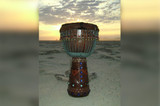Djembe Skins and Anthrax - The Facts
When participating in a drum circle, you might expect to be carried away by the beat of the drums and feel invigorated after. What you wouldn't expect is to develop a case of anthrax. The drum community was startled after recent reports surfaced that a woman participating in a New Hampshire drum circle developed a case of gastrointestinal anthrax. Although there have been reports of anthrax exposure due to spores being inhaled or entering through skin, this is the first report of gastrointestinal anthrax exposure in US history. This bacteria illness is not shared from person to person, but rather through exposure to certain animal skins or tainted meat and is a rare occurrence in developed nations such as the USA.
The drum circle in question was a group of 60 people in a house at United Campus Ministry in New Hampshire. Subsequent testing of the drums found anthrax on two of them, as well as residue on an electrical outlet. One of the drums in question had not been used in quite some time, and the other was a gift to the ministry. One of the persons running the drum circle for the ministry stated, "Most of our drums are from companies that do fair trade and sustainably harvested wood but in a shoestring operation, if people give you musical instruments, you take them."
Yes, it's scary to think that you could possibly be exposed to anthrax when drumming, but the reality is that reputable companies such as X8 Drums have safety proofed the industry by only dealing with established factories and distribution centers around the world. X8 has strict regulations on fumigation and skin treatment of the actual drum skin to eliminate the risk of contamination. Not every drum you encounter on the street will have the skin treated as part of the drum building process, so the need to buy from reputable companies is not just a smart decision, it's the safest one you can make.
As a consumer, there are a few things you can look out for when purchasing your hand drums. Prior to purchasing, inquire as to where the drums that the company purchases originate. If they have no true knowledge of their importation process, you are best to purchase elsewhere. When purchasing drums such as Djembes, ask if their drumheads are bleached. The skins that X8 Drums uses are bleached or treated in their factories.. The bleaching process will kill everything on the skin, and all of X8's Djembe drums are bleached with the exception of the Pro line, which uses a chemical process. Although not as powerful as the bleaching process, the chemical process treats the skin for bacteria and contaminants. As well, be aware that the highest risk for bacteria on a drum head comes from those with drumheads with hair, as they are difficult to treat and the treatment on these skins is salt curing, not chemicals.
It's always scary to read stories such as these, but you can rest assured that your drum is safe when you focus your efforts on educating yourself and purchase from highly reputable sites that focus on your safety and security such as X8 Drums.
Recent Posts
-
What is the Best Size Djembe for Beginners?
If you're new to the world of percussion and interested in learning the djembe, you're in for a t …16th Jul 2024 -
The Benefits of Becoming a Drumming Teacher: Transforming Passion into Profession
Why become a drumming teacher? Becoming a drumming teacher is an excellent way to share your pas …22nd May 2024 -
What Makes the Djembe Drum a Spiritual Instrument in African Music?
Origin and history of the Djembe drum The Djembe drum originates from West Africa and holds sign …16th May 2024



